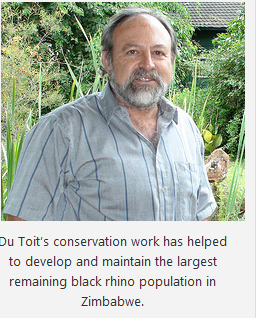 Kudos to Raoul du Toit, program coordinator of the International Rhino Foundation in Africa, who is being honored by the Goldman Environmental Prize this year.
Kudos to Raoul du Toit, program coordinator of the International Rhino Foundation in Africa, who is being honored by the Goldman Environmental Prize this year.
Du Toit’s conservation work has helped to develop and maintain the largest remaining black rhino population in Zimbabwe. While many conservation groups seek to protect wildlife from farmers, the International Rhino Foundation has a very different approach. Instead of telling farmers not to farm in areas where wildlife are present, they help communities realize that protecting wildlife can be in their own best interest.
Last year, Nourishing the Planet met with Du Toit in Zimbabwe and discussed some of his conservation methods. He emphasizes, for example, the importance of “landscape-level planning” that takes into account the needs of wildlife, the environment, and farming communities. Rather than relying on development agencies and governments to decide where cattle fences should go or where farmers should plant their crops, local communities and stakeholders need to be part of the process. Du Toit believes that engaging farmers is critical for the success of wildlife conservation. “We need to trust people on the ground, rather than just planning for them,” he says.

Danielle Nierenberg, an expert on livestock and sustainability, currently serves as Project Director of State of World 2011 for the Worldwatch Institute, a Washington, DC-based environmental think tank. Her knowledge of factory farming and its global spread and sustainable agriculture has been cited widely in the New York Times Magazine, the International Herald Tribune, the Washington Post, and
other publications.
Danielle worked for two years as a Peace Corps volunteer in the Dominican Republic. She is currently traveling across Africa looking at innovations that are working to alleviate hunger and poverty and blogging everyday at Worldwatch Institute’s Nourishing the Planet. She has a regular column with the Mail & Guardian, the Kansas City Star, and the Huffington Post and her writing was been featured in newspapers across Africa including the Cape Town Argus, the Zambia Daily Mail, Coast Week (Kenya), and other African publications. She holds an M.S. in agriculture, food, and environment from Tufts University and a B.A. in environmental policy from Monmouth College.








